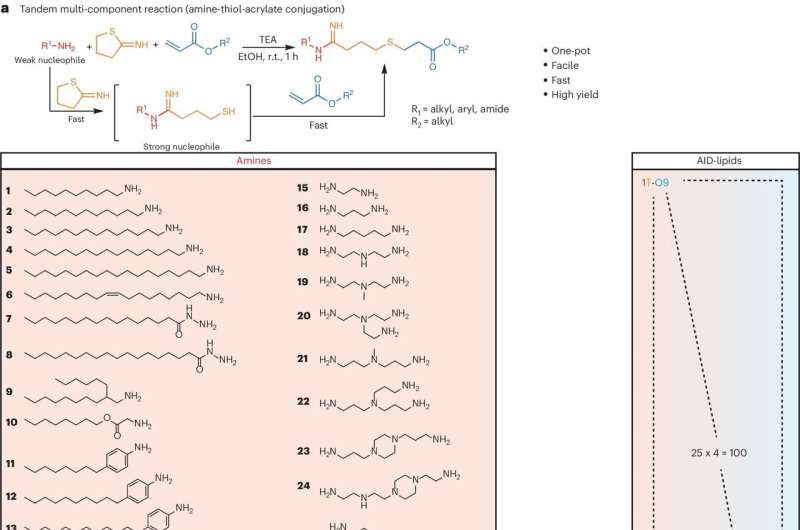
Think about a state of affairs the place a talented hacker should add crucial software program to replace a central server and thwart a doubtlessly deadly virus from wreaking havoc throughout an enormous laptop community. The programmer, armed with the lifesaving code, should navigate by means of treacherous territory teeming with adversaries, and success hinges on promptly getting a protected, stealthy supply automobile that may place the hacker precisely the place they must be.
Within the context of contemporary drugs, messenger RNA (mRNA) serves because the hacker, carrying genetic directions to provide particular proteins inside cells that may induce desired immune responses or sequester maladaptive mobile components. Lipid nanoparticles (LNPs) are the stealthy supply autos that transport these fragile mRNA molecules by means of the bloodstream to their goal cells, overcoming the physique’s defenses to ship their payload safely and effectively.
Nonetheless, very like constructing a sophisticated stealth automobile, the synthesis of cationic lipids—a sort of lipid molecule that is positively charged and a key element of LNPs—is commonly a time-consuming course of, involving a number of steps of chemical synthesis and purification.
Now, Michael Mitchell and a staff on the College of Pennsylvania have addressed this problem with a novel strategy that leverages a compound library fabrication approach referred to as “click-like chemistry” to create LNPs in a single, easy step. Their findings, printed within the journal Nature Chemistry, present that this technique not solely quickens the synthesis course of but in addition presents a technique to equip these supply autos with a “GPS” to raised goal particular organs such because the liver, lungs, and spleen, doubtlessly opening new avenues for treating a spread of ailments that come up in these organs.
“We have developed what we name an amidine-incorporated degradable (AID) lipid, a uniquely structured biodegradable molecule,” Mitchell says. “Consider it as an easy-to-build customized mRNA automobile with a physique equipment that informs its navigation system. By adjusting its form and degradability, we will improve mRNA supply into cells in a protected method. By adjusting the quantity of the AID lipid that we incorporate into the LNP, we will additionally information it to completely different organs within the physique, very like programming completely different locations right into a GPS.”
First creator Xuexiang Han, a former postdoctoral researcher within the Mitchell Lab, explains that their new strategy permits the speedy creation of various lipid constructions in simply an hour, in comparison with the weeks-long course of historically required.
“The result’s a big acceleration within the improvement and testing of AID-lipids,” he says. “This can allow us to discover a broader vary of lipid compositions and their results on mRNA supply.”

To realize these accelerated AID-lipid builds, the researchers made use of a tandem multicomponent response (T-MCR) to synthesize the AID-lipids, a course of that includes combining chemical compounds––an amine, thiol, and acrylate––in a single step to provide various lipid constructions quickly. The one-pot synthesis strategy considerably reduces the time wanted to provide cationic lipids, making it a extra environment friendly and scalable answer for mRNA-LNP supply.
Mitchell’s staff synthesized 100 completely different AID-lipids, which had been then formulated into LNPs. The ensuing LNPs had been examined for his or her potential to ship mRNA to varied organs in animal fashions, which confirmed the staff they may goal particular organs with excessive precision.
A key function of those AID-lipids is their potential to include degradable elements, guaranteeing that the LNPs break down safely throughout the physique after delivering their mRNA payload. This biodegradability is crucial for minimizing potential negative effects and guaranteeing that the therapeutic brokers don’t accumulate within the physique over time. The researchers demonstrated that the AID-lipid LNPs might successfully ship mRNA encoding purposeful proteins, highlighting their potential to be used in a variety of therapeutic functions.
One other vital discovering was the identification of a definite head (or tail) ring-alkyl aniline construction that proved significantly efficient in enhancing mRNA supply. This construction, which the staff dubbed the “wedge impact,” permits the LNPs to penetrate mobile membranes extra effectively, facilitating the discharge of mRNA into the goal cells. The research confirmed that LNPs with this construction achieved increased transfection efficiencies and better protein expression ranges in comparison with LNPs with out this construction.
The researchers additionally explored the potential of AID-lipid LNPs to ship mRNA vaccines concentrating on particular immune cells and demonstrated that these LNPs might selectively transfect antigen-presenting cells within the spleen, a crucial step for inducing strong immune responses.
“This discovering opens up new potentialities for growing mRNA-based vaccines that may exactly goal and activate the immune system, doubtlessly resulting in more practical and long-lasting immunity in opposition to numerous ailments,” Han says.
As Mitchell and the staff proceed to refine their platform, they’re specializing in much more exact concentrating on, significantly within the lungs.
“We’re now engaged on guiding our autos previous the preliminary barrier of blood vessels to achieve deeper into lung tissue,” Mitchell says. “It is a bit like programming our supply system to navigate by means of more and more advanced safety layers.”
Extra info:
Xuexiang Han et al, Quick and facile synthesis of amidine-incorporated degradable lipids for versatile mRNA supply in vivo, Nature Chemistry (2024). DOI: 10.1038/s41557-024-01557-2
Supplied by
College of Pennsylvania
Quotation:
Group pioneers a ‘one-pot platform’ to promptly produce mRNA supply particles (2024, July 9)
retrieved 10 July 2024
from https://phys.org/information/2024-07-team-pot-platform-promptly-mrna.html
This doc is topic to copyright. Aside from any truthful dealing for the aim of personal research or analysis, no
half could also be reproduced with out the written permission. The content material is supplied for info functions solely.


